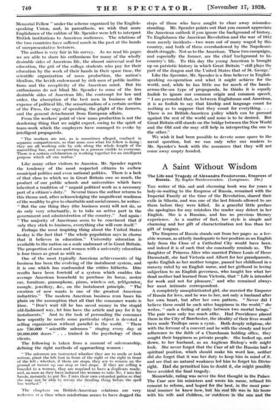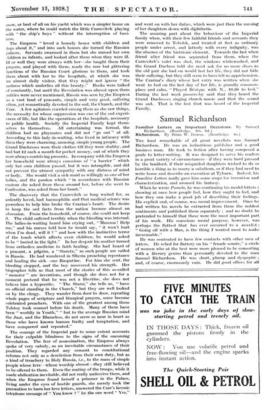A Saint Without Wisdom
The Life and Tragedy of Alexandra Feodorovna, Empress of Russia. By Sophie Buxhoevenden. (Longman. 28s.)
TUE writer of this sad and charming book was for years a lady-in-waiting to the Empress of Russia, remained with the Imperial Family at the time of the Revolution, shared their exile in Siberia, and was one of the last friends allowed to see them before they were killed. In a graceful little preface she apologizes for any mistakes the reader may detect in her English. She is a Russian, and has no previous literary experience. As a matter of fact, her style is simple and charming and her gift of characterization not less than her gift of tongues.
The Empress of Russia stands out from her pages as a lov- able woman, as utterly inadequate to her position as an English lady from the Close of a Cathedral City would have been, and indeed it is of such that she constantly reminds us. The daughter of Princess Alice who married Prince Louis of Hesse Darmstadt, she had Victoria and Albert for her grandparents, spoke English as her mother tongue, passed her childhood in a nursery ruled by an English nurse, and her girlhood in loving subjection to an English governess, who taught her what her dead mother had learned from Victoria, that " Life is intended for work and not for pleasure," and who remained always her most intimate correspondent.
A completely unsophisticated girl, she married the Emperor of Russia for love, and he was to her, not only a husband after her own heart, but after her own pattern. " Never did I believe there could be such utter happiness in the world," she writes, " such a feeling of unity between two mortal beings." The pair were only too much alike. Had Providence placed them in the City of Barchester, the ideality of their lives would have made Trollope seem a cynic. Both deeply religious, she with the fervour of a convert and he with the steady and loyal adherence to the faith of a Churchman holding office, they sought their happiness as private people. - She looked up, and down, to her husband, as an Anglican Bishop's wife might look. She never forgot that the Czar of all the Russias had a spiritual position, which should make his word law, neither did she forget that it was her duty to keep him in mind of it, and see that no natural weakness led him to forget his Divine right. Had she permitted him to doubt it, she Might possibly have avoided the final tragedy.
Meanwhile, ruling was never the first thought in the Palace The Czar saw his ministers and wrote his name, refused his consent to reform, and hoped for the best, in the most prac- tical manner he knew how, but his real life was in his home with his wife and children, or-outdoors in the sun and the
snow, or best of all on his yacht.which was a simpler home on the water, where he could watch the little Czarevitch playing with " the ship's boys " without the interruption of busi- ness.
The Empress " loved a homely house with children and dogs about it," and into such houses she turned the Russian palaces. Servants swarmed in them but she nursed her own !hildreii as infants, and looked after them when they were ill.
Ill or well they were always with her—she taught them their prayers, and played with them, made the rare but glittering functions of the Russian Court glorious to them, and took them about with her to the hospitals, at which she was an almost daily visitor, that they might not ignore " the sadness which underlies all this beauty." Books were talked of constantly, but until the Revolution was almost upon them politics were never mentioned, Russia was seen bythe Empress
as a vast land of peasants, simple and very good, suffering often, yet romantically devoted to the soil, the Church, and the Czar. A few agitators crawled among them as she saw things, the necessity for whose suppression was one of the sad experi- ences of life; but like the operations at the hospitals, necessary to public health. Socially the Imperial Family kept them- selves to themselves. All entertaining was formal, the children had no playmates and did not " go out " at all. According to this lady-in-waiting, who lived in intimacy with them they were charming, amusing. simple young people. The Grand Duchesses wore their clothes till they were shabby, and had but £2 each a month for pocket money, out of which they were always contriving presents. In company with the Empress her household were always conscious of " a barrier " which only her own children passed, but it was intangible, and did not prevent the utmost sympathy with any distress of mind or body. She would visit a sick maid as willingly as one of her ladies, and the pardon which " in accordance with Russian custom she asked from those around her, before she went to Confession, was asked from her heart."
The discovery that the Czarevitch so long waited for, so ardently laved, had haemophilia and that medical science was powerless to help him broke the Czarina's heart. The desire to keep the sad facts from the nation became almost an obsession. From the household, of course, she could not keep it. The child suffered terribly when the bleeding was internal. The ladies-in-waiting heard him crying out, " Mamma! Help me," and his nurses told how he would say, it won't hurt when I'm dead, will it ? " and how with the instinctive terror of the tomb which affects even children, he would asked to be " buried in the light." In her despair his mother turned from orthodox medicine to faith healing. She had heard of a peasant, a pilgrim, a " Staretz," as such people are called in Russia. He had wandered in Siberia preaching repentance and healing the sick—one Rasputine. For him she sent, the bleeding stopped, and the boy recovered his strength. Her biographer tells us that most of the stories of this so-called "monster " are inventions, and though she does not for a moment pretend that he was not a libertine, she does not believe him a hypocrite. " The Starzi," she tells us, " have no official standing in the Church," but they are well looked on by the clergy. They wander from door to door, repeating whole pages of scripture and liturgical prayers, some become celebrated preachers. With one of the greatest among them Tolstoy took counsel before his death. Many of them have been " worldly in Youth," " but to the average Russian mind the Just, and the Blameless, do not seem so near in heart as those who have known human frailty and temptation, and have conquered and repented."
The courage of the Imperial pair to some extent accounts for their culpable blindness to the signs of the oncoming Revolution. The fear of assassination, the Empress always spoke of very calmly, as an inevitable circumstance of their position. They regarded any consent to constitutional reforms not only as a dereliction from their own duty, but as a kind of treachery to Holy Russia, i.e., to the mass of simple people whose love—whose worship almost—they still believed to be offered to them. Even the mutiny of the troops, while it made abdication inevitable, did not really undeceive them, and when the Empress found herself a prisoner in the Palace, living under the eyes of hostile guards, she merely took the precaution to burn her love letters, answered the Czar's laconic telephone message of You know ? " by the one word " Yes,"
and went on with her duties, which were just then the nursing of her daughters down with diphtheria.
The amazing part about the behaviour of the Imperial family when, with their few faithful friends and servants they were removed to Tobolsk, and treated at first as ordinary people under arrest, and latterly with every indignity, was the absence of the histrionic element. Towards the last when friend after friend was separated from them, when the Czarevitch's valet was shot, the windows whitewashed, and the Grand Duchess told she need ask for no more shoes as the old pair she had on would last her life, they did not hide their suffering, but they still seem to have felt no apprehension. The Czarina's diary whose last entry was written when she went to bed on the last day of her life, is grandly common- place and calm, " Played Bezique with N., 10.30 to bed." During the last week passers-by said that they heard the Grand Duchesses singing church music and that the sound was sad.. That is the last that was heard of the Imperial Family.







































 Previous page
Previous page